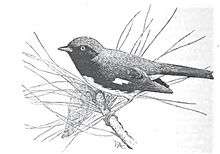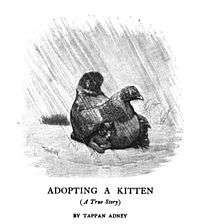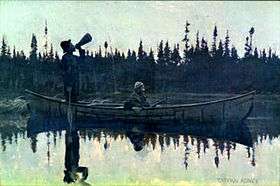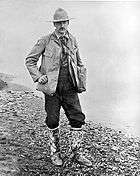Tappan Adney
| Tappan Adney | |
|---|---|
 Tappan Adney c. 1890 | |
| Born |
Edwin Tappan Adney July 13, 1868 Athens, Ohio |
| Died |
October 10, 1950 (aged 82) Woodstock, New Brunswick |
| Resting place | Upper Woodstock Cemetery |
| Nationality | American |
| Citizenship | American; Canadian |
| Notable work | The Klondike Stampede |
| Spouse(s) | Minnie Bell Sharp (m. 1899) |
| Children | Francis Glenn Adney (b. 1902) |
Edwin Tappan Adney (July 13, 1868 – October 10, 1950) was an artist, a writer and a photographer.
Biography
Edwin Tappan Adney was born in Athens, Ohio, the eldest child of William Harvey Glenn Adney (1834–1885) from Vinton, Ohio, a professor at Ohio University, and Ruth Clementine Shaw Adney. When Edwin was five, the family moved to Washington, Pennsylvania where his father taught at Washington and Jefferson College. In 1879, his father retired from that position for health reasons and bought a tobacco farm near Pittsboro, North Carolina named Gum Spring Plantation. Edwin was exceptionally bright and entered the University of North Carolina at Chapel Hill at the age of thirteen, where he remained for two years.[1]
New York

After his parents divorce, his mother took him and his younger sister Mary Ruth to New York City to further their education. To earn a living, she ran a boarding house, where Edwin got to know his future wife Minnie Bell Sharp of Woodstock, New Brunswick, a piano and singing student, who was one of his mother's tenants.[2] Edwin attended Trinity School and after leaving school he worked in a law office. In the evenings he took art classes at the Art Students League of New York.[2]

He graduated from art school at the age of eighteen and provided 110 illustrations for The Handbook of the Birds of Eastern North America.[1][3] His interest in birds continued when he emigrated to Canada and a visitor remarked on his relationship with the birds around his bungalow in Upper Woodstock. He would whistle bird-calls and the birds would flutter around him and sometimes land on his head.[4]
Canoe-building
In 1887, Edwin and his sister visited Minnie's family at their home in Woodstock, New Brunswick. Adney intended to spend a month in Woodstock preparing for the entry examination for Columbia University. While in Woodstock, he met Peter Jo, a canoe-builder of the Maliseet tribe of indigenous Canadians. He became interested in the language and culture and with Joseph's help, he built his first canoe, spending twenty months in Woodstock. In 1890, he wrote an article on canoe-building for a Harper's Young People supplement. He was credited with saving the art of birchbark canoe construction. He built more than 100 models of different types, which are now housed at the Mariners' Museum in Newport News, Virginia.[5]
Writer and illustrator


From 1890 onwards, Adney earned his reputation as a writer and illustrator for numerous magazine's including Harper's Weekly, Collier's Weekly, Harper's Young People, Saint Nicholas,[6][7][8][9] Outing,[10] and Our Animal Friends.[11]
He authored the book, The Klondike Stampede about the Klondike Gold Rush.[12] His photos of the Klondike Gold rush c. 1899 are available online via the McCord Museum.[13]
He occasionally wrote poetry:
THE MOOSE CALL
Chippers to its dusky mate;
From out the misty hill
A night owl's lonesome cry is heard—
A cry that sends a chill
Of fear through beast and sleeping bird—
Then all again is still.
Hark! the hunter starts!
A sound borne softly on the air
The mighty stillness parts
And makes the hunter's heart beat fast.
Tender, low, it thrills
The listening hunter's inmost soul:
Yet resonant it fills
The valley with an echo from
The everlasting hills!
EDWIN TAPPAN ADNEY[1]
- ^ Williams Haynes and Joseph LeRoy Harrison, editors (1917) Camp-Fire Verse p. 44, Duffield & Co., New York
Klondike Gold Rush


He was one of the first photojournalists to pass safely through British Columbia. As a writer for Harper's Weekly, he was sent with his camera to the Yukon from 1897 to 1898. His classic illustrated book concerns his experiences in the Yukon, of which numerous editions have been printed. He returned there to briefly report on the Nome Gold Rush in 1900. He retired first to Montreal, then to New Brunswick, the place where his wife was born. He learned the Maliseet language of the native Canadians of New Brunswick.[1]
Marriage

Adney married Minnie Sharp on September 12, 1899 at Saint Luke's Episcopal Church in Woodstock, New Brunswick.[14] They had one child, Francis Glenn Adney, born on July 9, 1902, in Woodstock, who became a minor jazz pianist and band leader in the United States. Both eccentric personalities, the couple lived together for only about a quarter of their 38-year marriage.[2]
Canadian naturalization
_original.tif.jpg)
In 1916, he joined the Royal Canadian Engineers. He became a Canadian citizen in 1917. He spent his World War I career as an engineering officer at the Royal Military College of Canada in Kingston, Ontario (1916–19) constructing scale models of fortifications for training purposes. His duties were non-combative and he remained in Canada for the duration of the war.
After the war, he created a set of three-dimensional coats-of-arms of the Canadian provinces and governors that adorn Currie Hall at Royal Military College of Canada.
In Montreal, Quebec he created heraldic art, worked for the Museum of McGill University as a consultant on aboriginal lore, and consulted to McCord Museum on canoes 1920–33.
Muralist
The lobby of the Hudson's Bay Company store on the corner of Portage Avenue and Memorial Boulevard in Winnipeg, Manitoba c. 1925 was decorated with immense murals depicting scenes of the Company's early history by Edward Tappan Adney and Adam Sheriff Scott.[15] Although one mural was removed, The Pioneer at Fort Garry (1861) remains to this day.[16]
His photos of rural Ontario c. 1930 are available online via the McCord Museum.[13] He then moved to Montreal, Quebec 1920–33 where he created heraldic art, worked for the Museum of McGill University as a consultant on aboriginal lore, and consulted to McCord Museum on canoes.
He is buried in the Upper Woodstock Cemetery, Woodstock, New Brunswick with his wife.[17]
Bibliography
- Bark Canoes, The Art and Obsession of Tappan Adney Jennings, John. A Firefly Book, 2004. ISBN 1-55297-733-1
- The Klondike Stampede, by Tappan Adney, Special Correspondent of Harper’s Weekly in the Klondike (New York: Harpers, 1900).
- The Sharp Family, 1908
- The Bark Canoes and Skin Boats of North America, Bulletin of the United States National Museum, with Howard I. Chappelle, 1964
References
- 1 2 3 Michael Gates (2014) "Tappan Adney and the Klondike Stampede", Western New York Public Broadcasting
- 1 2 3 Michael Gates (Oct. 2, 2009) "The naked truth about Tappan Adney", Yukon News
- 1 2 Frank Michler Chapman (1897) Handbook of Birds of Eastern North America, D. Appleton and Co., New York
- ↑ James W. Wheaton (2002) "Tappan Adney and Nature", Tappan Adney's Maliseet Studies: More Than Canoes
- ↑ C. T. Behne (2010) The Travel Journals of Tappan Adney 1887-1890, Goose Lane Editions, Fredericton ISBN 978-0-86492-628-9
- 1 2 Tappan Adney (1904) "Adopting a Kitten", Cat Stories, retold from St. Nicholas, pp. 69–70
- 1 2 Tappan Adney (March 1896) "Their First Moose Hunt", St. Nicholas Vol. 23, No. 5 pp. 376–383
- ↑ Charles G.D. Roberts (Feb. 1895) "Bruin's Boxing-Match", St. Nicholas, Vol. 22, No. 4 pp. 267–271
- ↑ Tappan Adney (Oct. 1894) "Billy: The Story of a Bear", St. Nicholas, Vol. 21, No. 12, pp. 1020–1024; Higher resolution image at the University of Florida
- ↑ Tappan Adney (March 1902) "The Indian Hunter of the Far North-West", Outing, Vol. 39, No. 6, pp. 623–633
- ↑ Our Animal Friends Vol. 21 (Sep. 1893–Aug. 1894) "A Queer Nesting Place" pp. 41–42; "The Old Camp Bird" pp. 176–178 ; "The Friendly Fish-Hawk" pp.222–225; Plus many other illustrations, ASPCA, New York
- ↑ Tappan Adney (1899) The Klondike Stampede, Harper & Bros., New York and London
- 1 2 McCord Museum, Montreal
- ↑ Explore the Works of Tappan Adney
- ↑ "The Bay, Winnipeg Downtown" Hudson's Bay Company
- ↑ Hudson's Bay Company
- ↑ Edwin Tappan Adney and Minnie Bell Sharp Adney at Find a Grave
External links
- The Klondike Stampede on the Internet Archive
- Edwin Tappan Adney and Howard I. Chapelle (1964) The Bark Canoes and Skin Boats of North America on the Internet Archive
| Wikimedia Commons has media related to Tappan Adney. |